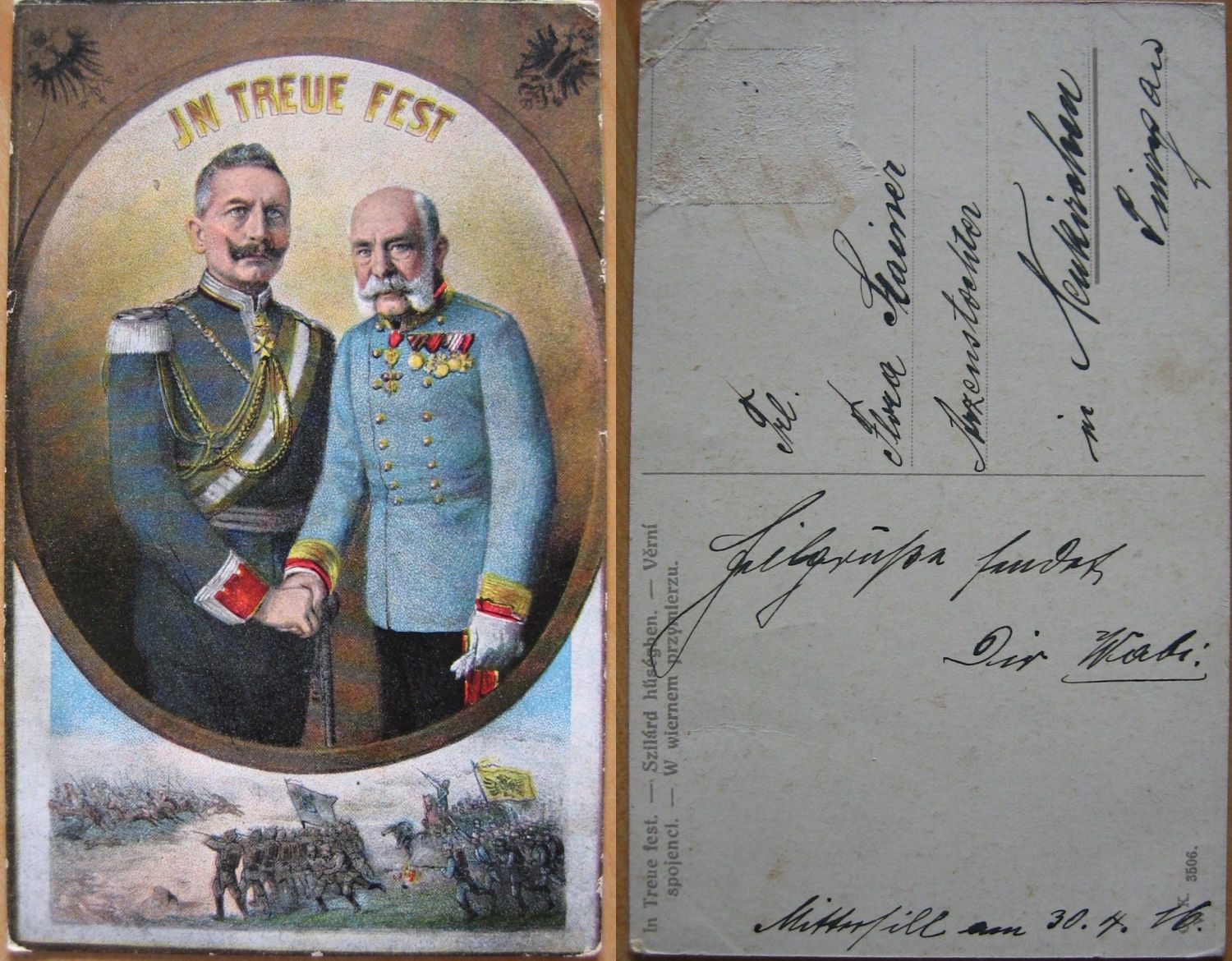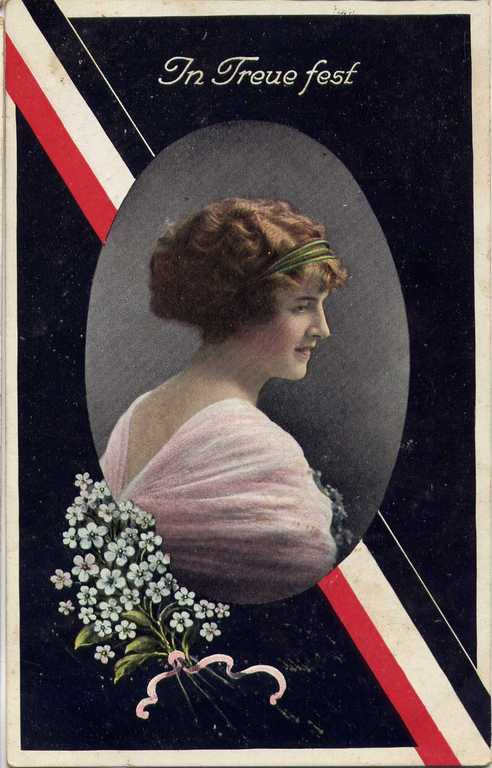In Treue Fest on:
[Wikipedia]
[Google]
[Amazon]

 ''In Treue fest'' (
''In Treue fest'' (
p. 102
*Carl Teike " In Treue Fest " (*mp
* ''In Treue fest. Kriegsbilder aus Ost und West''. Mainz, Scholz, ca. 1916. Quer 4°. "Künstler - Bilderbücher Nr. 14?", drawings by Franz Müller Münster Kingdom of Bavaria Military of Bavaria House of Wittelsbach Monarchism in Germany National mottos Military mottos Mottoes of orders of chivalry Order of Saint Hubert

 ''In Treue fest'' (
''In Treue fest'' (German
German(s) may refer to:
* Germany, the country of the Germans and German things
**Germania (Roman era)
* Germans, citizens of Germany, people of German ancestry, or native speakers of the German language
** For citizenship in Germany, see also Ge ...
for " steadfast in loyalty
Loyalty is a Fixation (psychology), devotion to a country, philosophy, group, or person. Philosophers disagree on what can be an object of loyalty, as some argue that loyalty is strictly interpersonal and only another human being can be the obj ...
; firm in fidelity") was the motto
A motto (derived from the Latin language, Latin , 'mutter', by way of Italian language, Italian , 'word' or 'sentence') is a Sentence (linguistics), sentence or phrase expressing a belief or purpose, or the general motivation or intention of a ...
of the Kingdom of Bavaria
The Kingdom of Bavaria ( ; ; spelled ''Baiern'' until 1825) was a German state that succeeded the former Electorate of Bavaria in 1806 and continued to exist until 1918. With the unification of Germany into the German Empire in 1871, the kingd ...
(1805–1918) and of its Wittelsbach
The House of Wittelsbach () is a former Bavarian dynasty, with branches that have ruled over territories including the Electorate of Bavaria, the Electoral Palatinate, the Electorate of Cologne, County of Holland, Holland, County of Zeeland, ...
rulers, after the end of World War I used by Bavarian monarchists.
The motto originates as that of the Order of Saint Hubert of the Dukes of Jülich and Berg, rendered in 15th-century Lower Franconian as ''in traw vast''. The order was defunct during the 17th century, and revived in 1708 under Johann Wilhelm, by which time the Duchy of Jülich-Berg had passed to the Palatinate branch of the House of Wittelsbach
The House of Wittelsbach () is a former Bavarian dynasty, with branches that have ruled over territories including the Electorate of Bavaria, the Electoral Palatinate, the Electorate of Cologne, County of Holland, Holland, County of Zeeland, ...
. The order was brought to Bavaria
Bavaria, officially the Free State of Bavaria, is a States of Germany, state in the southeast of Germany. With an area of , it is the list of German states by area, largest German state by land area, comprising approximately 1/5 of the total l ...
in 1778 when Charles Theodore, Duke of Jülich and Berg and Count-Elector Palatine, succeeded his childless cousin, Maximilian III Joseph as Elector of Bavaria
The following is a list of monarchs during the history of Bavaria. Bavaria was ruled by several dukes and kings, partitioned and reunited, under several dynasties. Since 1918, Bavaria has been under a republican form of government, and from 19 ...
. In 1799, Charles Theodore was succeeded by Maximilian I Joseph of Bavaria
Maximilian I Joseph (; 27 May 1756 – 13 October 1825) was Duke of Zweibrücken from 1795 to 1799, prince-elector of Bavaria (as Maximilian IV Joseph) from 1799 to 1806, then King of Bavaria (as Maximilian I Joseph) from 1806 to 1825. He was ...
, a member of a different branch of the house of Wittelsbach, who became the first king of Bavaria
The King of Bavaria () was a title held by the hereditary Wittelsbach rulers of Bavaria in the state known as the Kingdom of Bavaria from 1805 until 1918, when the kingdom was abolished. It was the second time Bavaria was a kingdom, almost a t ...
.
The motto is the title of two military marches
In medieval Europe, a march or mark was, in broad terms, any kind of borderland, as opposed to a state's "heartland". More specifically, a march was a border between realms or a neutral buffer zone under joint control of two states in which diffe ...
, one
1 (one, unit, unity) is a number, numeral, and glyph. It is the first and smallest positive integer of the infinite sequence of natural numbers. This fundamental property has led to its unique uses in other fields, ranging from science to sp ...
by Carl Teike (1903, English title "Steadfast and True") and another by August Högn
August Högn (2 August 187813 December 1961) was a German teacher, composer and historian.
Biography
August Högn was born on 2 August 1878, the middle of five children to married bookbinders Andreas and Helene Högn in Deggendorf. Like all ...
(1905). It is invoked in the final verse of the '' Argonnerwaldlied'' (1914).
From 1909, the motto was embossed on the belt buckles of Bavarian troops. During the First World War
World War I or the First World War (28 July 1914 – 11 November 1918), also known as the Great War, was a World war, global conflict between two coalitions: the Allies of World War I, Allies (or Entente) and the Central Powers. Fighting to ...
, the motto was frequently reproduced on postcards and other memorabilia, often with the portraits of emperors Wilhelm II
Wilhelm II (Friedrich Wilhelm Viktor Albert; 27 January 18594 June 1941) was the last German Emperor and King of Prussia from 1888 until Abdication of Wilhelm II, his abdication in 1918, which marked the end of the German Empire as well as th ...
and Franz Joseph I
Franz Joseph I or Francis Joseph I ( ; ; 18 August 1830 – 21 November 1916) was Emperor of Austria, King of Hungary, and the ruler of the Grand title of the emperor of Austria, other states of the Habsburg monarchy from 1848 until his death ...
. The "fidelity" invoked in the motto was now interpreted as referring to the loyalty of the German Empire
The German Empire (),; ; World Book, Inc. ''The World Book dictionary, Volume 1''. World Book, Inc., 2003. p. 572. States that Deutsches Reich translates as "German Realm" and was a former official name of Germany. also referred to as Imperia ...
and Austria-Hungary
Austria-Hungary, also referred to as the Austro-Hungarian Empire, the Dual Monarchy or the Habsburg Monarchy, was a multi-national constitutional monarchy in Central Europe#Before World War I, Central Europe between 1867 and 1918. A military ...
to their alliance of 1879 in view of the increasing political isolation of the Central Powers
The Central Powers, also known as the Central Empires,; ; , ; were one of the two main coalitions that fought in World War I (1914–1918). It consisted of the German Empire, Austria-Hungary, the Ottoman Empire, and the Kingdom of Bulga ...
on the eve of the Great War.
Bernhard von Bülow
Bernhard Heinrich Karl Martin, Prince of Bülow ( ; 3 May 1849 – 28 October 1929) was a German politician who served as the chancellor of the German Empire, imperial chancellor of the German Empire and minister-president of Prussia from 1900 to ...
invoked the mutual loyalty between Germany and Austria-Hungary in 1909 as '' Nibelungentreue'' in his ''Reichstag'' speech of 29 March 1909.
After the First World War it became the motto of German monarchists and of veteran associations also outside of Bavaria. Thus, ''IN TREUE FEST'' is inscribed on the war memorial
A war memorial is a building, monument, statue, or other edifice to celebrate a war or victory, or (predominating in modern times) to commemorate those who died or were injured in a war.
Symbolism
Historical usage
It has ...
in Sörhausen, Syke
Syke () is a town in the district of Diepholz, Lower Saxony, Germany. It is situated approximately 20 km south of Bremen.
Population
* 1961: 16,203
* 1970: 17,013
* 1979: 19,413
* 1987: 18,796
* 1992: 21,411
* 1997: 23,340
* 2002: 23,7 ...
, Lower Saxony
Lower Saxony is a States of Germany, German state (') in Northern Germany, northwestern Germany. It is the second-largest state by land area, with , and fourth-largest in population (8 million in 2021) among the 16 ' of the Germany, Federal Re ...
.
In 1921, the Bavarian nationalist and royalist league ''In Treue fest'' was founded at the Sterneckerbräu. It was banned by the Nazis on 2 February 1933, and later re-established in 1952.
Because of its association with monarchism, the motto unlike other German military slogans (notably the term ''Nibelungentreue'') remained unassociated with Nazi ideology
Nazism (), formally named National Socialism (NS; , ), is the far-right totalitarian socio-political ideology and practices associated with Adolf Hitler and the Nazi Party (NSDAP) in Germany. During Hitler's rise to power, it was freque ...
and is still in use by a number of German associations, including ''Tambourcorps "In Treue fest"'' ( Anstel, founded 1919/20),
''Neusser Tambourkorps "In Treue fest"'' (Neuss
Neuss (; written ''Neuß'' until 1968; ; ) is a city in North Rhine-Westphalia, Germany. It is on the west bank of the Rhine opposite Düsseldorf. Neuss is the largest city within the Rhein-Kreis Neuss district. It is primarily known for its ...
, founded 1968).
Bavarian Studentenverbindung
() or , often referred to as , is the umbrella term for many different kinds of fraternity-type associations in German-speaking countries, including Corps, , , , and Catholic fraternities. Worldwide, there are over 1,600 , about a thousand in ...
''KBStV Rhaetia München'' (founded 1881) uses the motto ''cum fide virtus'' ("virtue with loyalty"), intended as a Latin translation of the Wittelsbacher motto;
''KStV Alamannia Tübingen
Tübingen (; ) is a traditional college town, university city in central Baden-Württemberg, Germany. It is situated south of the state capital, Stuttgart, and developed on both sides of the Neckar and Ammer (Neckar), Ammer rivers. about one in ...
'' uses the Latin translation ''In fide firmitas'' ("steadfastness in loyalty").
See also
* Monarchism in Bavaria after 1918 * Bayernhymne *''Semper fidelis
''Semper fidelis'' () is a Latin phrase that means "always faithful" or "always loyal" (Fidelis or Fidelity). It is the motto of the United States Marine Corps, usually shortened to Semper Fi. It is also in use as a motto for towns, families, ...
''
References
{{reflistSources
*Joost Augusteijn, Storm. H. J., ''Region and State in Nineteenth-Century Europe: Nation-Building, Regional Identities and Separatism'', Palgrave Macmillan, 2012p. 102
*Carl Teike " In Treue Fest " (*mp
* ''In Treue fest. Kriegsbilder aus Ost und West''. Mainz, Scholz, ca. 1916. Quer 4°. "Künstler - Bilderbücher Nr. 14?", drawings by Franz Müller Münster Kingdom of Bavaria Military of Bavaria House of Wittelsbach Monarchism in Germany National mottos Military mottos Mottoes of orders of chivalry Order of Saint Hubert